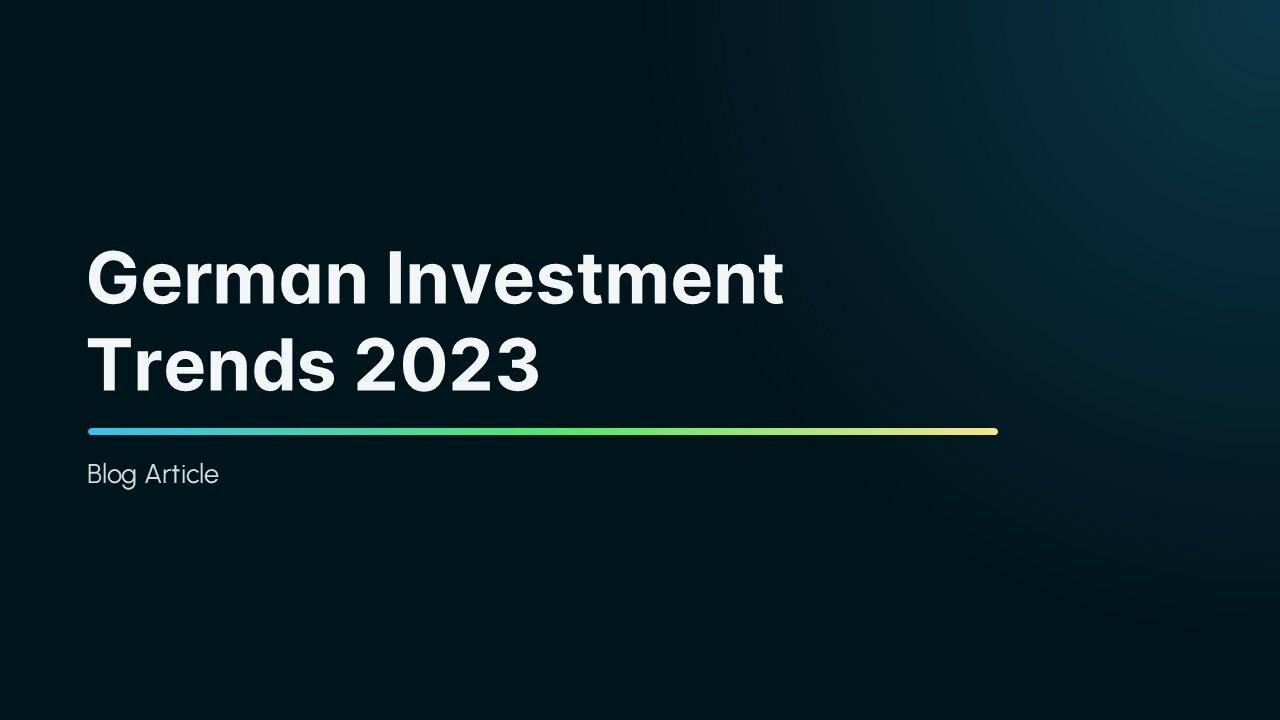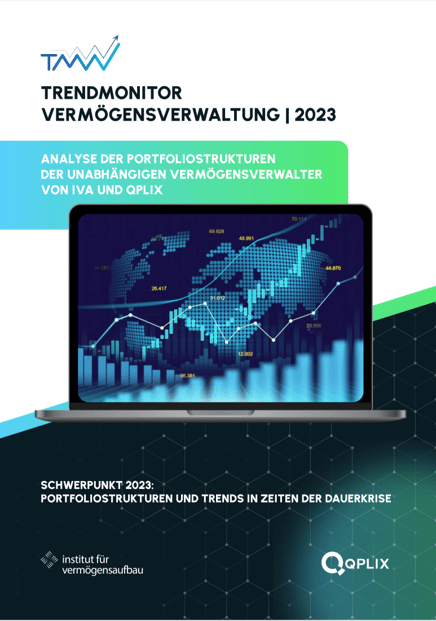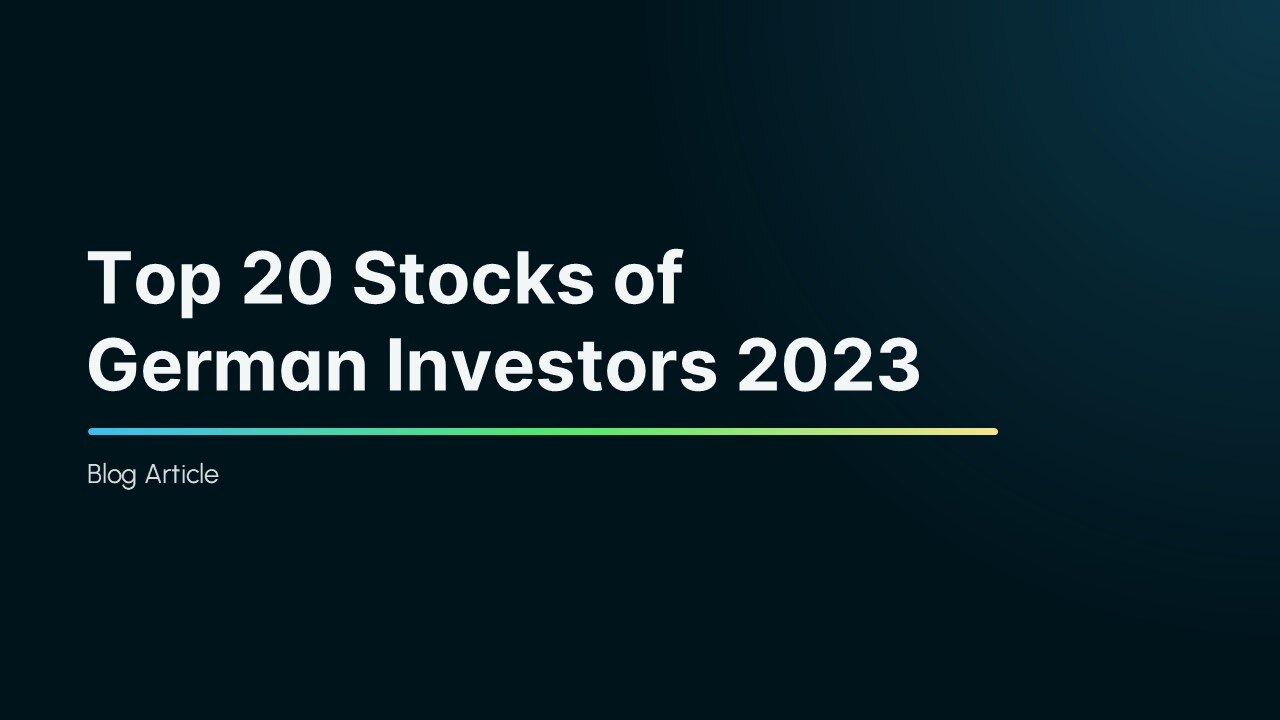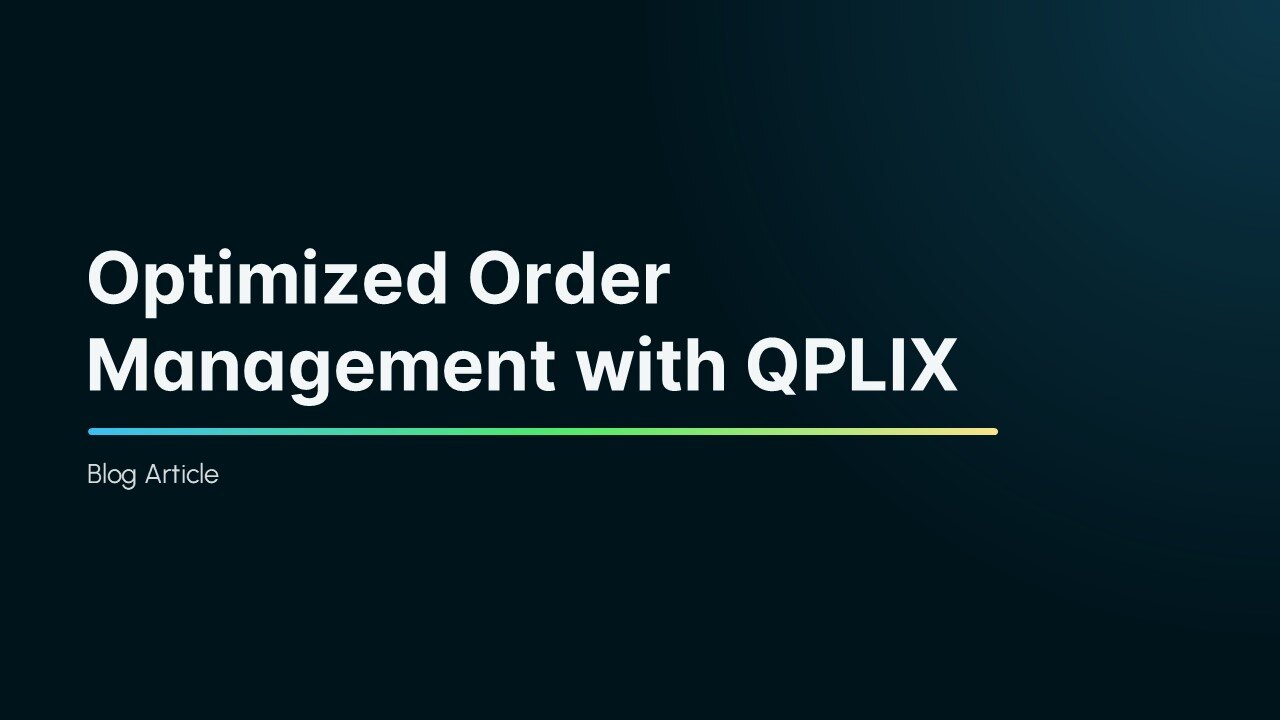Investment Behavior in Germany: Insights from the Trend Monitor Wealth Management 2023

How do Germans invest? The Institut für Vermögensaufbau (IVA) and wealth management software provider QPLIX have investigated this question and presented the German-language study "Trendmonitor Vermögensverwaltung (TMVV)".
With more than 54,000 real client portfolios analysed, the TMVV is the largest and most in-depth analysis of its kind in the German-speaking world. The TMVV is a spin-off of the CAPITAL studies Top Asset Managers 2019 to 2023, in which over 100 independent asset managers took part. The anonymous and aggregated portfolio holdings data was provided for the studies by the custodian banks V-BANK, DAB BNP Paribas, Deutsche Bank, Baaderbank and Donner & Reuschel on the basis of authorisation by the participating asset managers. IVA and QPLIX have now analysed this anonymous data from an asset allocation perspective and published it for the first time in the Trend Monitor.
In the study, IVA and QPLIX analysed the composition of portfolios in 2022 (equities, funds, bonds) as well as shifts over the past five years. The study also contains special analyses of the Ukraine crisis (energy, defence), the coronavirus pandemic (pharmaceuticals, home office) and trend topics such as ESG and cryptocurrencies. TMVV also identifies the 20 most popular shares among Germans and compares the structure of smaller and larger portfolios.

The Trendmonitor Vermögensverwaltung 2023 (in German only) is available to download free of charge:
https://iva.tmvv.qplix.com/de/
"In collaboration with the business magazine CAPITAL, we have been analysing a large number of real client portfolios of German independent asset managers every year for the past five years as part of the Germany's Top Asset Managers study. Together with our technology partner QPLIX, we are now taking the next step by using this huge wealth of data on asset allocation for an anonymised trend analysis with the new Trendmonitor Vermögensverwaltung," says Andreas Ritter, CEO of the Institut für Vermögensaufbau. "There is probably no other analysis that answers the question of how independent asset managers invest assets on behalf of their clients in such depth and detail."
"We are proud to contribute to the anonymous analysis of more than 50,000 real portfolios with our QPLIX technology. The result is by far the broadest data-driven analysis of the portfolio structure of professional investors in the German-speaking world," said Kai Linde, co-founder and CEO of QPLIX. "I found it particularly exciting to look at the last five years - which included the coronavirus pandemic and the Ukraine crisis," added Sebastian Deck, Marketing Director at QPLIX and co-author of the study. "We are delighted to be able to regularly present a well-founded analysis of how the portfolios of independent asset managers are composed and how their structure changes over time with the Trend Monitor together with the IVA." Portfolios not only reflect long-term megatrends in the global economy such as globalisation, digitalisation or resource scarcity, but they also react to short-term events such as wars, economic crises or government economic stimulus programmes, similar to a seismograph of the global economy. "Unlike surveys, they don't just reflect sentiment, but also show in very concrete terms what financial impact investment professionals really attribute to certain developments and how they react to them on behalf of their clients," says Deck.
ASSET PORTFOLIO AS A SEISMOGRAPH
- Ukraine war: "Turning point" in the portfolio: the proportion of defence companies has doubled since 2022 - albeit from a low level. In 2019, the proportion of defence stocks was already significantly higher. However, the downward trend could have reversed permanently. "The Russian war of aggression against Ukraine is having the strongest impact in the energy sector: asset managers were happy to take the profits from this special boom as a result of the high electricity and gas prices in the first half of 2022 on behalf of their clients through investments in energy companies," explains Deck.
- Coronavirus pandemic: the general trend towards technology companies is accelerating rapidly in portfolios. Ritter: "The US tech megacorporations have almost doubled their share in the portfolios. Home office-related stocks such as video conferencing providers have even tripled their share, and this trend has stabilised in this segment over the long term." By contrast, the healthcare sector experienced a temporary coronavirus boom from the first quarter of 2020 and in 2021, which levelled off again with the pandemic.
- "America first" - Good bye "Old Europe": When it comes to investing in the future, asset managers are increasingly focussing on US equities. The proportion of European securities has been in constant decline since 2018. The share of "euro" countries has even fallen by more than ten percentage points overall in the period under review - falling below 30% for the first time in 2022. "This development is of course also linked to the popularity of the US tech giants and the strong performance of the US equity market in recent years and thus reflects a rather procyclical investment behaviour," notes Ritter. "China has been steadily losing ground in the regional rankings in recent years, which is probably due not only to the increased geopolitical risks, but also to the generally weakening economy."
- Low interest rate phase: the equity share will reach a high of 60% in 2021, while bonds will fall below the 20% threshold for the first time in 2022. However, the latest portfolio changes show the harbingers of an interest rate turnaround: The average residual maturities within bond portfolios are falling significantly.
- Media trends ESG & cryptocurrencies: The hype topics of ESG and cryptocurrencies ("crypto assets") show that media attention does not correlate analogously with reality. "The trend monitor shows neither a shift towards ESG-compliant companies nor the birth of a new relevant asset class through cryptocurrencies," says Deck. "In professionally managed portfolios, their share is more in the per mille range."
Trendmonitor Vermögensverwaltung
The Trendmonitor Vermögensverwaltung (TMVV) is a spin-off of the CAPITAL studies Top Asset Managers 2019 to 2023 and is the largest data-based analysis of the investment behaviour of professional asset managers in German-speaking countries. The TMVV was published in this form for the first time in 2023 and is based on a cooperation between the Institut für Vermögensaufbau (IVA) and wealth management software provider QPLIX for CAPITAL magazine's annual Top Asset Managers study. The analysis now covers over 54,000 real client portfolios. More than 100 independent asset managers have agreed to the anonymised and aggregated analysis of their portfolios. In concrete terms, this currently means a database of more than 22,292 securities (including property funds, REITs, etc.) and more than 7636 funds and ETFs. The portfolio holdings are evaluated for the study four times a year, at the beginning of each calendar quarter. The portfolio holdings are provided by the custodian banks V-BANK, DAB BNP Paribas, Deutsche Bank, Baaderbank and Donner & Reuschel and are partially consolidated and processed with the help of the wealth management software platform from QPLIX, the leading specialist for digital asset management. The overall evaluation, on which the interpretation of the analysis is based, is made up of the criteria groups "portfolio structure", "product implementation", "risk management", "cost efficiency" and "performance".
- Would you like to know more? Sign up for an on-demand webinar by QPLIX, IVA & CAPITAL where experts Nadine Oberhuber, Andreas Ritter and Sebastian Deck discuss in more detail how trends and crises over the past five years have influenced portfolio management.



